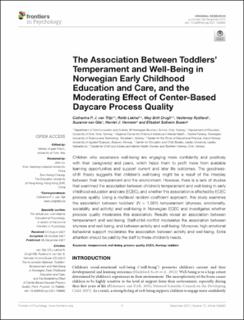| dc.contributor.author | Van Trijp, Catharina Petronella Johanna | |
| dc.contributor.author | Lekhal, Ratib | |
| dc.contributor.author | Drugli, May Britt | |
| dc.contributor.author | Rydland, Veslemøy | |
| dc.contributor.author | van Gils, Suzanne | |
| dc.contributor.author | Vermeer, Harriet J | |
| dc.contributor.author | Buøen, Elisabet Solheim | |
| dc.date.accessioned | 2022-02-15T10:21:33Z | |
| dc.date.available | 2022-02-15T10:21:33Z | |
| dc.date.created | 2021-11-16T10:06:42Z | |
| dc.date.issued | 2021 | |
| dc.identifier.citation | Frontiers in Psychology. 2021, 12 . | en_US |
| dc.identifier.issn | 1664-1078 | |
| dc.identifier.uri | https://hdl.handle.net/11250/2979048 | |
| dc.description | Copyright © 2021 van Trijp, Lekhal, Drugli, Rydland, van Gils, Vermeer and Buøen. This is an open-access article distributed under the terms of the Creative Commons Attribution License (CC BY). The use, distribution or reproduction in other forums
is permitted, provided the original author(s) and the copyright owner(s) are credited and that the original publication in this journal is cited, in accordance with accepted academic practice. No use, distribution or reproduction is permitted which does not comply with these terms. | en_US |
| dc.description.abstract | Children who experience well-being are engaging more confidently and positively with their caregiver(s) and peers, which helps them to profit more from available learning opportunities and support current and later life outcomes. The goodness-of-fit theory suggests that children’s well-being might be a result of the interplay between their temperament and the environment. However, there is a lack of studies that examined the association between children’s temperament and well-being in early childhood education and care (ECEC), and whether this association is affected by ECEC process quality. Using a multilevel random coefficient approach, this study examines the association between toddlers’ (N = 1,561) temperament (shyness, emotionality, sociability, and activity) and well-being in Norwegian ECEC and investigates whether process quality moderates this association. Results reveal an association between temperament and well-being. Staff-child conflict moderates the association between shyness and well-being, and between activity and well-being. Moreover, high emotional behavioral support moderates the association between activity and well-being. Extra attention should be paid by the staff to these children’s needs. | en_US |
| dc.language.iso | eng | en_US |
| dc.rights | Navngivelse 4.0 Internasjonal | * |
| dc.rights.uri | http://creativecommons.org/licenses/by/4.0/deed.no | * |
| dc.subject | temperament | en_US |
| dc.subject | well-being | en_US |
| dc.subject | process quality | en_US |
| dc.subject | ECEC | en_US |
| dc.subject | Norway | en_US |
| dc.subject | toddlers | en_US |
| dc.title | The Association between Toddlers’ Temperament and Well-Being in Norwegian Early Childhood Education and Care, and the Moderating Effect of Center-Based Daycare Process Quality. | en_US |
| dc.type | Peer reviewed | en_US |
| dc.type | Journal article | en_US |
| dc.description.version | publishedVersion | en_US |
| dc.subject.nsi | VDP::Samfunnsvitenskap: 200::Pedagogiske fag: 280 | en_US |
| dc.source.pagenumber | 12 | en_US |
| dc.source.volume | 12 | en_US |
| dc.source.journal | Frontiers in Psychology | en_US |
| dc.identifier.doi | 10.3389/fpsyg.2021.763682 | |
| dc.identifier.cristin | 1954997 | |
| dc.relation.project | Norges forskningsråd: 260624 | en_US |
| dc.source.articlenumber | 763682 | en_US |
| cristin.ispublished | true | |
| cristin.fulltext | original | |
| cristin.fulltext | original | |
| cristin.qualitycode | 1 | |

